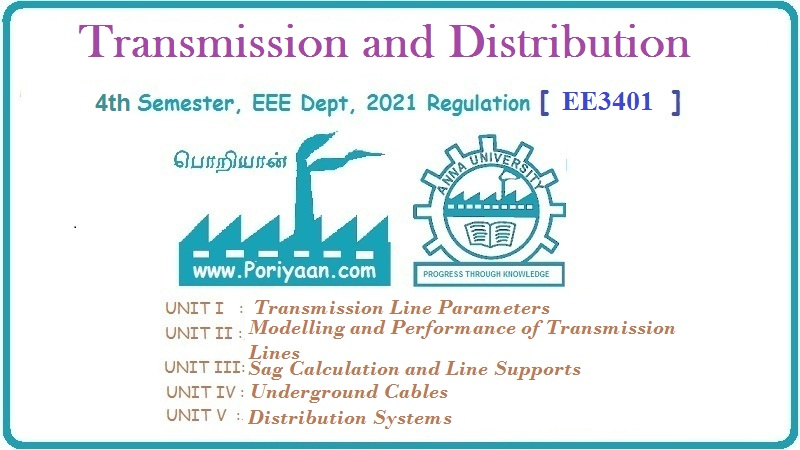Transmission and Distribution: AU Solved Paper
AU Solved Paper
Semester - IV (EEE) (Regulation 2013)
Transmission and Distribution: AU Solved Paper : Semester - IV (EEE) (Regulation 2013)
AU Solved Paper [50482]
December - 2017
Transmission and
Distribution
Semester - IV (EEE)
(Regulation 2013)
[Time :
Three Hours]
[Maximum Marks : 100
Answer ALL questions
PART - A (10 x 2 = 20 Marks)
Q.1 What is interconnected system ?
[Refer Two Marks Q.44 of Chapter - 7]
Q.2 What is the objectives of FACTS ?
[Refer Two Marks Q.17 of Chapter - 7]
Q.3 Why the concept of self GMD is not
applicable for capacitance calculation ?
[Refer Two Marks Q.44 of Chapter - 1]
Q.4 What is transposition ? Why are
transmission line transposed ?
[Refer Two Marks Q.45 of Chapter - 1]
Q.5 How are transmission line classified
?
[Refer Two Marks Q.2 of Chapter - 2]
Q.6 What is Ferranti effect ?
[Refer Two Marks Q.6 of Chapter - 2]
Q.7 What is a belted-cable ?
[Refer Two Marks Q.34 of Chapter - 6]
Q.8 What
are the desirable properties of insulator ?
[Refer Two Marks Q.10 of Chapter - 5]
Q.9 What
are the major equipments of a substation ?
[Refer Two Marks Q.17 of Chapter - 8]
Q.10 Give
the significance of a stringing chart.
[Refer Two Marks Q.2 of Chapter - 4]
PART - B (5 × 13 = 65 Marks)
Q.11 a) i) Draw and explain the
structure of typical electrical power system with various voltage levels.
[Refer section 1.2] [8]
ii) Draw and explain a simple model of
UPFC.
[Refer section 7.29.4] [5]
OR
b) i) Briefly discuss the technical
advantages of HVDC over HVAC transmission system.
[Refer section 7.25.2] [8]
ii) Explain the applications of HVDC
transmission system.
[Refer section 7.25.4] [5]
Q.12 a) Describe the expression for
calculating the internal and external flux linkages for a conductor carrying
current. Use these expressions to derive the equation for the inductance of a
single - phase transmission line.
[Refer sections 1.11 and 1.12][13]
OR
b) Derive an expression for capacitance
of a three overhead line.
[Refer section 1.30]
Q.13 a) i) Draw the phasor diagram of a
short transmission line and derive an expression for voltage regulation and
transmission efficiency.
[Refer section 2.7] [7]
ii) A three - phase transmission line
having a series impedance of (20 + j30) Q delivers 7 MW at 33 kV and 0.8 lagging
power factor. Find the sending end voltage, regulation and power angle. Neglect
shunt capacitance.
[Refer example 2.7.4] [6]
OR
b) i) Deduce the expression for the
sending end and receiving end power of a transmission line in terms of voltages
and ABCD constants.
[Refer section 2.14] [7]
ii) Briefly explain the procedure of
drawing receiving end power circle diagram.
[Refer section 2.15] [6]
Q.14 a) With neat diagram, explain the
various methods of grading of underground cables.
[Refer section 6.8] [13]
OR
b) i) Discuss
the constructional features of pin type insulators.
[Refer section 5.3.1] [7]
ii) An insulator string consists of
three units each having a safe working voltage of 15 kV. The ratio of self -
capacitance to shunt capacitance is 6 : 1. Determine the line voltage and
string efficiency.
[Refer example 5.5.1] [6]
Q.15 a) i) Prove that a transmission
line conductor between two supports at equal heights takes the form of a
catenary.
[Refer section 4.6] [7]
ii) What is a sag - template ? Explain how
this is useful for location of towers and stringing of power conductors.
[Refer section 4.9] [6]
OR
b) Describe about the various methods of
neutral grounding in detail.
[Refer section 8.13]
PART - C (1 × 15 = 15 Marks)
Q.16 a) Derive the expression of
capacitance of a bundled conductor.
[Refer section 1.32]
OR
b) Discuss the methods of range of
voltage control in transmission line.
[Refer section 7.18]
Transmission and Distribution: AU Solved Paper : Tag: : Semester - IV (EEE) (Regulation 2013) - AU Solved Paper
Related Topics
Related Subjects
Transmission and Distribution
EE3401 TD 4th Semester EEE Dept | 2021 Regulation | 4th Semester EEE Dept 2021 Regulation
